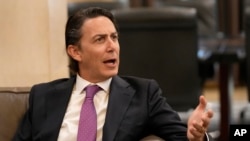A U.S. special envoy visited Lebanon this week in a bid to de-escalate border tensions between Israel and the Iran-backed Hezbollah, Lebanon’s military and political powerbroker.
Amos Hochstein, the U.S. special presidential coordinator for global infrastructure and energy security, brokered an historic maritime boundary agreement between warring Lebanon and Israel last October.
Now, a war of words has escalated in recent months between Hezbollah and Israel over the land border while they prepare for possible conflict, even as they deny seeking one.
Professor Habib Malik of the Lebanese American University told VOA that “the tensions, whether real or partly staged, will not lead to any military showdown between Hezbollah and the IDF,” referring to Israeli Defense Forces.
Rather, Malik said, the U.S. envoy’s visit was to “oversee the deep-sea oil and gas exploration in Block 9, to explore a deal on the land border with Israel, and also to try and calm rising tensions between Hezbollah and Israel on the border.”
Lebanon’s National News Service quoted Hochstein as saying he visited south Lebanon “to understand and learn more about what is needed to potentially achieve an outcome.”
Hochstein said he was “carrying out a feasibility study about the possibility of conducting a mediation that would eliminate the disputed points within the land border demarcation dossier.” He plans to hear Israel’s view “and to make an assessment if this is the right time and if we have a window of opportunity to be able to achieve it.”
Currently, a demarcation line between the two countries, known as the Blue Line, designates a frontier mapped by the United Nations marking where Israeli forces withdrew when they left south Lebanon in 2000.
Hochstein’s visit coincided with the U.N. Security Council’s renewal of the peacekeeping operation’s mandate in Lebanon, known as UNIFIL, established in 1978. The mandate was broadened this year so that “UNIFIL does not require prior authorization or permission to undertake its mandated tasks” and “is authorized to conduct its operations independently.” But it will engage in “continuing coordination with the Lebanese government.”
Dania Koleilat Khatib, president of the Research Center for Cooperation and Peace Building in Beirut, told VOA that Hezbollah is not happy U.N. peacekeepers have more freedom of movement.
“Hezbollah is in a Catch-22,” Khatib said. “They want UNIFIL because UNIFIL prevents a strike by Israel. But they want a restricted UNIFIL because they don’t want them to go and uncover their weapons depots, their structures, their facilities. The UNIFIL Irish soldier was killed because he went somewhere he was not supposed to go. He discovered something that he should not have discovered. They shot him.”
Last December, an Irish UNIFIL peacekeeper was shot and killed and a second wounded after a hostile crowd surrounded their armored vehicle in southern Lebanon. Five Hezbollah members were charged. Hezbollah officially denies involvement in the killing, calling it an "unintentional incident.”




